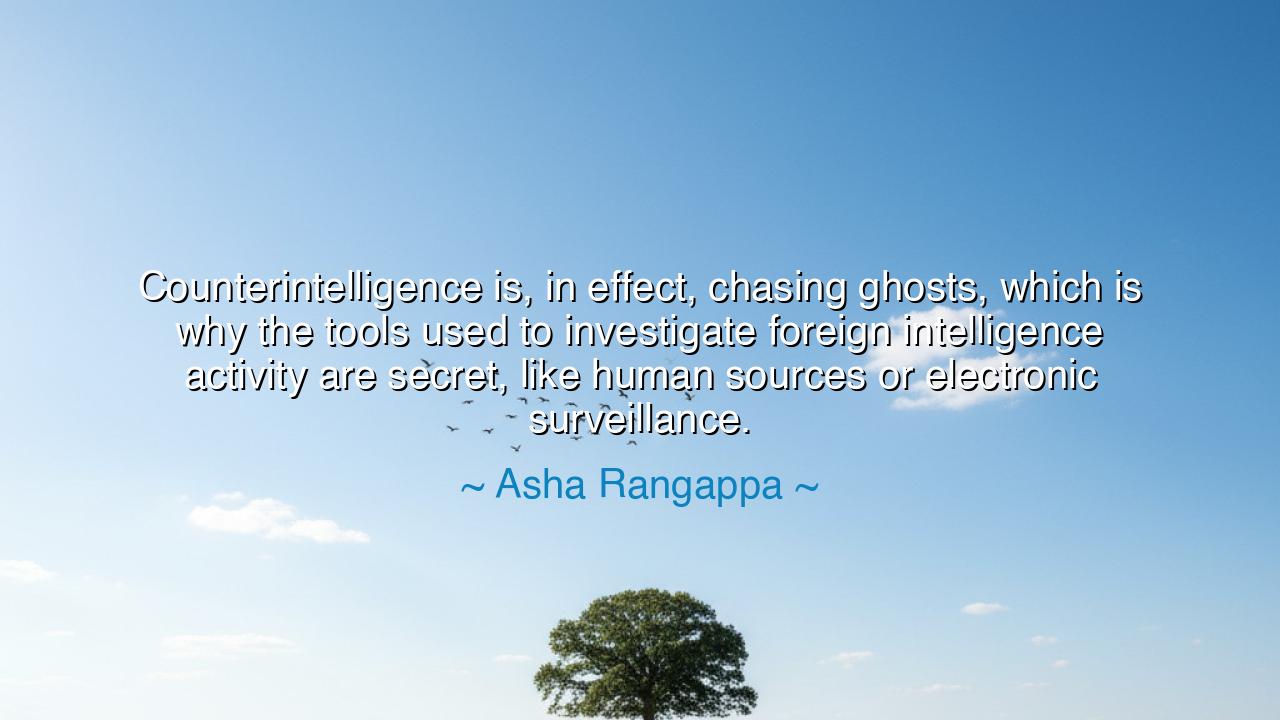
Counterintelligence is, in effect, chasing ghosts, which is why
Counterintelligence is, in effect, chasing ghosts, which is why the tools used to investigate foreign intelligence activity are secret, like human sources or electronic surveillance.






“Counterintelligence is, in effect, chasing ghosts, which is why the tools used to investigate foreign intelligence activity are secret, like human sources or electronic surveillance.” — Asha Rangappa
In this haunting reflection, Asha Rangappa, a scholar and former FBI agent, unveils the hidden struggle that unfolds in the shadows — the eternal duel between truth and deception, knowledge and secrecy. To her, counterintelligence is not a simple pursuit of enemies, but a hunt for ghosts — for forces unseen, for whispers in the dark, for the traces of minds that move in silence. It is a war fought not with swords or banners, but with secrets, trust, and vigilance. The phrase “chasing ghosts” captures the essence of a discipline where nothing is certain, where every clue fades like smoke, and where the greatest weapon is not might, but awareness.
The origin of this quote lies in Rangappa’s deep experience within the world of intelligence and security, a world few ever glimpse. As a counterintelligence agent, she walked among shadows — tracking foreign operatives, decoding hidden motives, and defending her nation against infiltration and deceit. In speaking of ghosts, she acknowledges both the difficulty and the mystery of this work. For unlike open battle, counterintelligence wars are fought in the invisible realm of espionage, where truth hides behind layers of falsehood and the enemy may wear a friendly face. The tools of this craft — human sources, electronic surveillance, and the quiet observation of patterns — are as secret as the threats they guard against. To reveal them would be to disarm oneself in the very struggle that protects freedom.
The ancients, too, knew this battle of shadows. In the time of Sun Tzu, the Chinese sage of strategy, spies were revered as the “eyes and ears of the ruler.” He wrote that “to know your enemy, you must become your enemy.” The masters of old understood that the greatest victories are often won before the battle begins — in the realm of information, deception, and foresight. In every empire and every age, those who guarded the realm from infiltration worked unseen, like sentinels who hear the approach of danger before the city even stirs. Such is the life of the counterintelligence agent: to live among illusions, yet remain rooted in truth; to see the unseen, yet never be seen.
Yet there is a deeper wisdom hidden in Rangappa’s words, one that reaches beyond governments and spies — for all of us, in some way, must chase ghosts in our own lives. The human heart, too, is filled with invisible battles. We chase the ghost of fear, the ghost of doubt, the ghost of betrayal that lingers from old wounds. Like the agent who guards her nation, each of us must learn to recognize these shadows for what they are, to study them quietly, and to confront them with truth. And just as the agent must protect her sources, so too must we guard the fragile intelligence of the soul — the inner voice that warns, guides, and sees what the eyes cannot.
In the world of nations, the ghosts of deceit are relentless. Consider the tale of Operation Double Cross during the Second World War. The British intelligence service, through brilliant counterintelligence work, turned captured German spies into double agents. These ghosts — once enemies — became instruments of deception against their own masters. Through secrecy, patience, and psychological insight, the Allies fed false information to Nazi Germany, leading them to misjudge the timing and location of the D-Day invasion. Here, the unseen war shaped the visible one, proving that victory often belongs to those who master the invisible before the visible begins.
Thus, Rangappa’s quote is not merely about intelligence agencies — it is about wisdom in all human endeavor. It teaches that the unseen forces — motives, fears, ambitions — often shape the visible outcomes of life. To navigate them requires humility, discipline, and the willingness to move in silence. It is the way of the strategist, the teacher, the leader, and the seeker of truth. Just as the counterintelligence officer must act without recognition, so must we learn to labor in quiet strength, guided not by applause but by purpose.
The lesson, then, is clear: in every life, there are ghosts to be chased — lies to be unmasked, dangers to be understood, and truths to be protected. Whether in the defense of nations or in the defense of one’s integrity, intelligence is the lantern that lights the dark. Guard your mind as the agent guards her secrets. Learn to see what is hidden, to listen for what is unsaid, to think before you act. For wisdom, like counterintelligence, is the art of knowing without being known, of seeing without being seen. And remember always: the true strength of the vigilant is not in what they reveal, but in what they understand.
So, children of thought and shadow, take to heart the teaching of Asha Rangappa: life itself is a field of hidden forces, and only those who walk with eyes open in the dark will find their way. Seek truth quietly. Guard it fiercely. And when you must chase your ghosts — whether they haunt nations or your own soul — do so with courage, patience, and the calm intelligence that turns fear into understanding and darkness into light.






AAdministratorAdministrator
Welcome, honored guests. Please leave a comment, we will respond soon